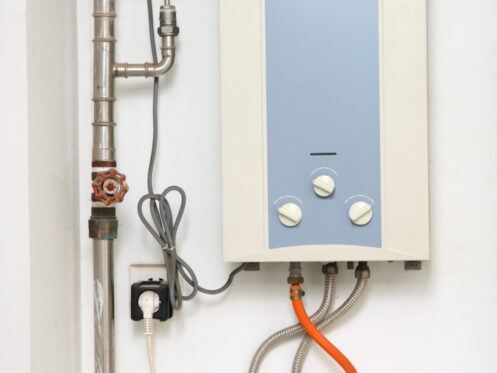A water heater is an essential apparatus in every home. It allows you and other house residents to do chores like laundry, dishes and personal hygiene using water at a comfortable temperature. The most common types are tank water heaters, but tankless units are becoming increasingly popular. Being a newer type of technology, though, many homeowners are uncertain about adopting them compared to heaters they know. In this article, we will go over some of the pros and cons of tankless water heaters.
The Pros of Tankless Water Heaters
The following are a few compelling reasons why a tankless water heater might be a good choice for your home.
1. You Save Valuable Space
A tankless water heater is significantly smaller than the traditional tank model, meaning you will not need a 40+ gallon water tank. Tankless water heaters are compact – they are usually wall-mounted, which greatly saves valuable space in your home. That also means you can easily hide it away, and even if it is installed in plain sight, it isn’t going to draw nearly as much attention as a storage tank would.
2. No More Rationing of Hot Water
Most homeowners recount having to ration hot water during showers to avoid using up all the hot water stored in the tank; you may have even had to choose between taking a hot shower or running the dishwasher. However, that does not happen with tankless water heaters since they heat the water on an as-needed basis when you turn the faucet on. Some tankless units can struggle to heat water if you need it in multiple places at once, but with the variety of capacities on the market, you can find something to avoid that altogether.
3. Longer Life Span
Tankless water heater models last longer than tank-style units. Where tank heaters that use gas tend to last anywhere from eight to 12 years and electric ones around 10 to 15, tankless water heaters can function well for a good 15 to 20 years instead. With durability comes greater value for your money and better peace of mind. It can also help to know that your heater has a long life span if you plan to stay in that home for the long term.
4. Energy Efficiency
Tankless water heaters have been proven to consume less energy than storage tank models. That is primarily because they eliminate the possibility of standby energy loss, which happens when water loses heat as it sits unused in the tank. Plus, since they don’t have to continually use energy to heat up such a large volume of water, you will likely see your utility bill decrease.
5. More Safety
Safety is a primary concern for homeowners, especially if young kids are in the picture. Traditional water heaters are prone to overheating and can even fail or combust. Since tankless water heaters hold very little water, the probability of overheating or explosion is almost negligible. The chances of water leakage are significantly lower, too, and even in the event of a leak, you can expect less water damage.
The Cons of Tankless Water Heaters
While tankless water heaters boast many benefits, it’s not an all-roses affair. Below are some of the disadvantages of this type of heater.
1. High Upfront Investment
Although operating a tankless water heater is cheaper, you have to spend more money upfront than you would with traditional models. Besides the high purchase price, you also have to factor in the installation cost, which is higher than alternatives.
2. Multiple Units for Larger Homes
The demand for hot water is usually proportional to the size of the family or home. If you have a bigger family or a larger property, there will be a higher demand for hot water. In that case, a single tankless water heater might not be sufficient. You would have to invest in more than one tankless water heater or purchase a high-end model with a very high flow rate.
3. The Cold-Water Sandwich Effect
The cold-water sandwich is a problem common to most tankless water heaters. It is a situation where you get a gush of warm water once you turn the faucet on, followed by some cold water, then hot water again. If you are carrying out a small task, such as washing your hands, it might not be a big problem. However, it can be a considerable nuisance when carrying out a bigger task, like taking a shower.
You can avoid the cold-water sandwich effect by installing a recirculating system. However, that might lead to other adverse effects, such as more energy consumption and a shorter lifespan for your system. The alternative is adding a small storage tank heater directly into the water outlet.
4. Complex Installation Process
Fitting a tankless water heater can be a complex process. Most homes must be adapted to meet code requirements to safely accommodate a tankless water heater. That could mean installing new wiring or gas lines, piping, and fittings. Ensure you hire a certified technician to avoid violating code and permit requirements, not to mention to make sure your heater is installed safely and correctly from the onset.
Maintenance and Repair Requirements for Tankless Water Heaters
Tankless water heaters require less attention and replacement parts compared to their traditional counterparts. However, that doesn’t mean they don’t need any maintenance at all. One of the things you need to do is cleaning or replacing the water line filter. That filter protects against hard water, scale, and sediments. Over time, these elements can build up, affecting your water heater’s effectiveness. They can also get passed along to the rest of your plumbing. If you purchase a tankless water heater without a built-in filter, you might consider adding one to improve the water quality in your home and safeguard your plumbing.
Another thing you need to do to ensure your system is working optimally is to replace the filter as necessary. When you have your heater installed, be sure to ask your technician what the ideal frequency is or if the heater will alert you when it is time for a new filter. You also need to descale and flush the system from time to time. We recommend descaling and flushing the unit annually if you have hard water. On the other hand, if your system has soft water or a water softener system, you can do so every three to five years. This is a complicated process, which is why we advise contacting professionals.
Call Tankless Water Heater Pros
If you need expert tankless water heater services in Denver or the surrounding area, our professionals at Summit Heating, A/C, Plumbing & Electrical are the experts to call. Since our business was opened in 1998, we have provided high-quality services to many clients in the area. Contact us today at Summit Heating, A/C, Plumbing & Electrical if you need professional tankless water heater services in Denver or the nearby area.


